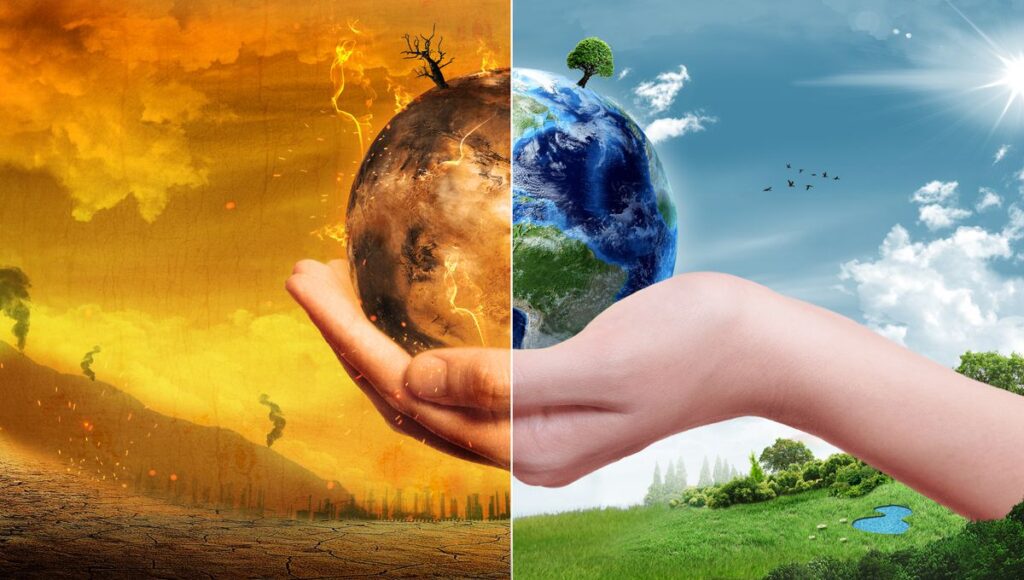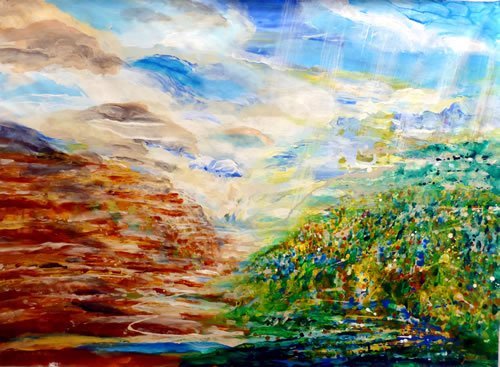In this house, we believe:
Black Lives Matter / Women’s Rights Are Human Rights / No Human Is Illegal / Science Is Real / Love Is Love/ Kindness Is Everything.
There are other lawn signs of this ilk out there as well – some with universal messages, and sadly others with hostile and provocative messages, even occasionally funny ones like: “No lives matter. You all suck equally.”
With these and other messages in mind, I contemplated how we might inspire one another in this longed-for and incredible in-person ingathering. That, in turn, brought up some fundamental thoughts about what being part of our temple community is really about for me. And that caused me to recall the first time I walked into our building at 1827 California Ave. It was just after the ratification of the merger between Beth Sholom Temple, the oldest synagogue in Santa Monica, and Temple Shir Shalom, then renting space in the basement of St. Bede’s Episcopal Church in Mar Vista. I was the founding rabbi of Temple Shir Shalom, and I’d spent twelve years in an office in the church’s basement. When we did Shabbat services upstairs in the sanctuary, we respectfully shrouded the large cross behind the altar, brought up our portable ark, and plugged in our eternal light (clearly not eternal!). So, on that first day after the merger, when our Office Manager and I walked into 1827, I exclaimed, “Barbara, it’s a JEWISH building!” Among the identifying markers were a Jewish star, a Magen David, a Jewish star on the railing of the steps to the front door, a mezuzah on the front doorpost, and mezuzot on the inside doorways as well. Adorning one wall were photos of confirmation classes dating back to when…Moses’ kids were confirmed. A classically fashioned, Ashkenazi-style ark set deep into the raised bima, the pulpit, and a Ner Tamid, a permanently lit eternal light, hung suspended above. In the rear of the sanctuary was a “Yahrtzeit Wall,” with most of the memorial plaques already engraved or reserved for the future. Even though it was my first day as the rabbi in our building, it felt familiar, comfortable, venerable, home.
What about all those sacred signs and symbols that made 1827 a “Jewish building” for me? Some of you have heard me pass on a teaching from my liturgy professor, Rabbi Dr. Larry Hoffman, who said, “The phrase merely symbolic should be stricken from the English language. Things are symbolic, or they’re not.” He firmly believes that once an object or a place is long-vested with specific symbolism, either by an individual, a family, or a group of people, especially if customs and rituals re-enforce them, others could not blithely strip that symbolism away. So it was for me at and within 1827 California.
The Torah contains a story about the earliest distinguishing of Jewish spaces. The story concerns a non-Jewish soothsayer named Balaam, whom a king hires to curse the Jewish people. He blesses our homes instead. He does not do so of his own volition. He hears the voice of God within him, and the Voice mandates that he substitute the curse with a blessing. The words of the blessing are equally well-known, perhaps to some of us here. The blessing says,
מַה־טֹּ֥בוּ אֹהָלֶ֖יךָ יַעֲקֹ֑ב מִשְׁכְּנֹתֶ֖יךָ יִשְׂרָאֵֽל׃,
Ma tovu ohalecha Ya’akov, mishk’notecha Yisrael, “How goodly are your tents O Jacob your dwelling places O Israel.”
Many synagogues have these words written on a wall of the sanctuary, indicating that the place is also a “goodly tent,” a descendant of the tents Balaam viewed as he proclaimed the blessing. While we don’t have the phrase on our walls at 1827, I hope that many, if not most of us, feel our building is a “goodly tent.”
Our tradition says we can “turn” the words of the Torah over and over, and we can always find something new in them. This year, I saw something new in this Torah story. I realized the famous words of Mah Tovu were not the only blessing given to the Jewish people by Balaam. The Moabite king, Balak, took him to three different vantage points overlooking the encampment of the Israelites just outside the king’s realm while encouraging Balaam to invoke a curse. Each time Balaam filled his words with praise and adoration for the Jews and their God. Each time the king’s fury grew hotter, and each time Balaam said,
“I can only repeat faithfully what יהוה, Adonai, puts in my mouth.”
There was, of course, a reason why King Balak desired a disabling curse upon the Jewish people. He feared them. The text recounts he knew well of our liberation from Egypt and how God cleared a path for us away from the Egyptians and enabled us to defeat many other kings and kingdoms along our journey. Balaam clearly states to Balak that this will be Balak and Moav’s fate as well should Balak try to oppose the Israelites and יהוה, Adonai. After the second curse that became a blessing, Balaam describes our ancient Israelite ancestors saying,
“Lo, a people that rises like a lioness/Leaps up like a lion/Rests not till it has feasted on prey/And drunk the blood of the slain.”
Before we become too outraged about what the text tells us about that early history, let us remember who this text’s real audience was. It wasn’t Balaam and Balak. The target was the fledgling Jewish people who needed to be assured that God would be with them through their wilderness pilgrimage and beyond.
Still, I assume some, if not many of us, don’t resonate well with a text telling us our ancestors drank the blood of their vanquished enemies! Further, for some, our theologies are tainted by cynicism in the wake of the Holocaust, other world events, and personal tragedies. We have difficulty believing in a God who defeats our enemies and is the omniscient and omnipresent guardian of the Jewish people or anyone else.
The dissonance produced by the clash of our mores with those of our ancestors might cause us to ask, “What can an ancient tale like this do for me in 2022, in the midst of a persistent pandemic, the planet teetering on the edge of climate disaster and too much of the world in or near the folly of war?” The answer both stares us in the face and hides in plain sight, much like a lawn sign we see and forget.
We find that answer in the words that Balaam kept saying each time he ignored King Balak’s command to curse the Jewish people,
“Only that which the Eternal designates for my speech must I heed and speak.”
However, just before the final blessing, Balaam changes his phrasing, saying,
“But I told you: Whatever יהוה says, that I must do.”
In this instance, Balaam goes beyond merely reiterating God’s dictated words of praise and admiration. Now, he’s talking about how he feels he must behave. Proclaiming a moral message verbally – or on a lawn sign – is one thing. Acting in a spiritually inspired manner is quite another. Balaam declares he feels a holy mandate to conduct himself in a particular fashion.
Holy mandates of conduct have been the Jewish people’s way of being since Egypt. As you probably know, we call them mitzvot, commandments. They define who we are for ourselves and the world at large, but I believe we have a misperception of the source of those mandates.
The traditional perspective is that God gives those commandments, and we, the Jewish people, fulfilling our part of the covenant, respond. In turn, God protects. However, when we see horrible calamities crashing in upon the lives of innocents, a challenge arises, especially for Reform Jews, between the tradition of “Commander and commanded” and the world around us we understand all too well. God command//we follow/God shelters-and-defends doesn’t seem to work. We can either face this challenge or walk away. Many of us have already thrown up our hands in frustration, even anger, at a theological construct that appears unfair and harsh. We feel no obligation to adhere to what the tradition says are divine mandates because divine recognition for our compliance seems completely absent. Moreover, the dense shadow of the Holocaust shatters the belief that fulfilling the commandments translates into God being our shield. How many thousands of observant Jews did the Nazis slaughter whose faithfulness should have saved them?
However, later Jewish tradition argues that we should not expect a response from God when we light candles for Shabbat or decide not to have a bacon cheeseburger. In Pirke Avot, the Ethics of the Sages, we are advised that our actions will not result in some sort of compensation. (1:3) Antigonus of Socho, speaking from the teachings of Shimon the Righteous, says, “Do not be like servants who serve a master in the expectation of receiving a reward…” (2:1) Yehuda haNasi says: “…You do not know the reward for the fulfillment of the commandments…”
Finally, (5:23), a rabbi with the great name of Ben Hey Hey goes even further, saying: “Effort is its own reward.” For one of my favorite teachers, Rabbi Rami Shapiro, this means: “The reward for your effort is the effort itself. Do not imagine that you will earn something at the end of your life; your life itself is the gift. There is no point to living; living is the point. There is no purpose to living; living is the purpose. As long as you imagine that doing leads to getting, you will never appreciate the act of doing.”
Here’s an example from my rabbinate’s early years of the kind of “reward” Rabbi Shapiro elucidates. In 1987 then-Governor George Deukmejian signed a bill granting tax rebates to Californians totaling $1.1 billion. As soon as I became aware of this windfall we were all about to receive, I asked Temple Shir Shalom whether they would join me in signing over their checks to the temple so that we could, in turn, give the money to the homeless and poor. A significant percentage of our members did so, one of whom, Leonard Vine, volunteered to make a giant “Publishers’ Clearing House-style” check to present to a local agency. Shortly thereafter, we handed that check to a local social service organization during a Shabbat celebration.
Such a “reward” happened again three years later, almost immediately after the merger. Two long-time Beth Sholom members, Doris and Norty Smirlock, who volunteered weekly for “Meals on Wheels,” approached me with a concern. They said Meals on Wheels did not operate on Christmas Day and thought the newly formed Beth Shir Shalom should take over. So we did, and so we’ve continued to do for thirty-one years. Why did we do these things? That California tax rebate was rightfully ours to keep and spend individually. No one “told” us to give the funds away. Instead, we did it because we felt an internal spiritual and social mandate. Likewise, Norty, Doris, and the countless volunteers over three decades who made a Christmas Day meal for Meals on Wheels clients felt a call from their kishkes. The soothsayer Balaam might say, “God told them to do it.” I don’t think that all, or even most of those who gave and continue to give, feel that. Instead, a sense arose in this community, creating a determination that something barely seen as a possibility needed to become a must.
That legacy rests on our shoulders and hearts. What are our “musts?” Where are the places we must show up? What are the actions we must take, the petitions we must sign, the letters we must write, the social responsibilities we must take on?
We may look no further than a lawn sign for the answer, but there’s a Jewish version of these notions that, I believe, should be the lawn sign of our building at 1827 California and perhaps our homes as well. Our version comes from a Mishnah, our oldest rabbinic Torah commentary. Versus the now ubiquitous emblem, this lawn sign doesn’t say what we believe. Instead, it declares what we do. So, the sign I envision would say: “These are our actions. Their value is priceless. In and outside this house we:
Respect the past and, in it, implant new seeds.
Act with loving kindness.
Engage in lifelong education.
Welcome the stranger.
Celebrate all loving families.
Honor the circle of life.
Pray with our hands, our hearts, our breath, our minds, our eyes, our ears, our mouths, and our legs.
Much as I felt the impact of those Jewish symbols that first day at 1827, I was wrong. What defines Beth Shir Shalom as a Jewish community is not the various accouterments and accessories commonly extant in Jewish buildings. It’s not our beliefs either. It’s what we do. Our synagogue isn’t a “goodly, Jewish tent” because we’re in it. Our tent is “goodly” because of how we choose to behave in it and what we do from it – outside its walls.
Here, in this beautiful moment, as we meet in person for the first time in two years for our holiest days, we lift up our values and mandates and commit ourselves to the actions that make us a Jewish community, the Beth Shir Shalom community.
From the depths of my heart and soul, I wish you a good year – reflective, fulfilling, and healthy. Shana Tova
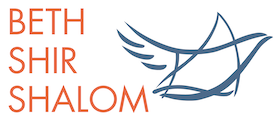
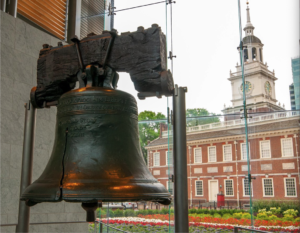 Growing up in Philadelphia made me feel close to history. If you’ve ever visited the Old City – or seen the movie National Treasure – you’ve seen the *riveting* Liberty Bell, inscribed with the words of Leviticus.
Growing up in Philadelphia made me feel close to history. If you’ve ever visited the Old City – or seen the movie National Treasure – you’ve seen the *riveting* Liberty Bell, inscribed with the words of Leviticus. 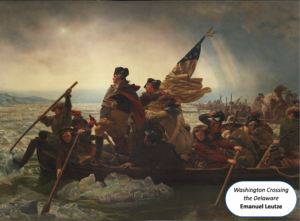 Washington’s Crossing of the Delaware River was an important turning point in the Revolutionary war.
Washington’s Crossing of the Delaware River was an important turning point in the Revolutionary war. 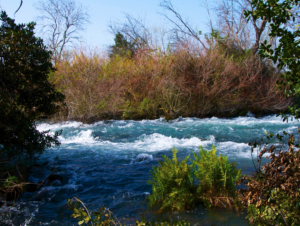 Our patriarch Avraham, the midrash teaches, gained the nickname Avram Ha-Ivri – the one who crossed the river. His biblical journey begins when God tells him, “Lech L’cha!” Go forth – or more literally – go to yourself. Leave this place, God tells Avram, so that you might find yourself, your destiny. Leave your father’s home and set out. Cross the Euphrates river away from here to a land and a future that I will show you across another river, the Jordan river. But Avram Ha-Ivri & Sarai are not the only patriarch & matriarch to meaningfully cross a river in the Torah.
Our patriarch Avraham, the midrash teaches, gained the nickname Avram Ha-Ivri – the one who crossed the river. His biblical journey begins when God tells him, “Lech L’cha!” Go forth – or more literally – go to yourself. Leave this place, God tells Avram, so that you might find yourself, your destiny. Leave your father’s home and set out. Cross the Euphrates river away from here to a land and a future that I will show you across another river, the Jordan river. But Avram Ha-Ivri & Sarai are not the only patriarch & matriarch to meaningfully cross a river in the Torah. 